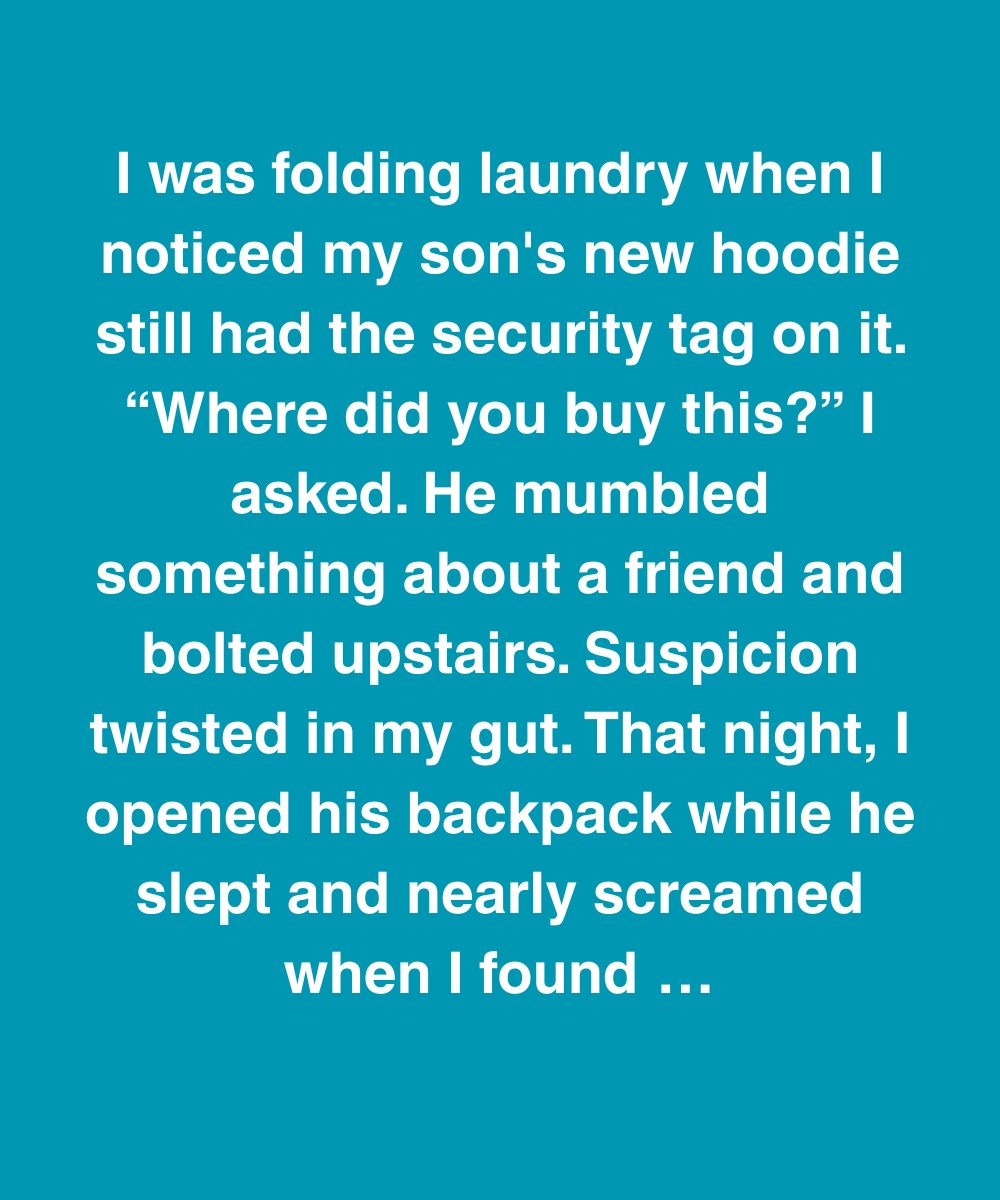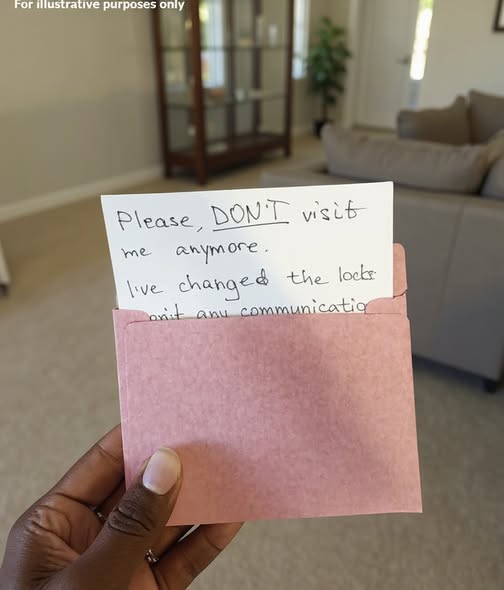
I was folding laundry when I noticed my son’s new hoodie still had the security tag on it. “Where did you buy this?” I asked. He mumbled something about a friend and bolted upstairs. Suspicion twisted in my gut. That night, I opened his backpack while he slept and nearly screamed when I found a handful of new clothing tags, three more security-wrapped shirts, and a store receipt with the barcode blacked out.
My heart raced. I looked over at him, asleep with his headphones on, completely unaware. My son—my sweet, goofy, video-game-obsessed thirteen-year-old—was hiding something big from me. I sat there on his carpet, surrounded by clothes I didn’t remember buying, trying to connect the dots.
I didn’t want to believe it. My first instinct was to blame someone else. Maybe his friends pressured him. Maybe someone gave him stolen stuff. Or maybe—just maybe—he didn’t understand what he was doing. But those thoughts were more for my comfort than rooted in truth.
The next morning, I waited until we were alone in the car before bringing it up. I didn’t yell. I just asked him again, gently, “Where did you get the hoodie? And the shirts?” He stared out the window for a long time. Then, in a voice barely above a whisper, he said, “I took them. From Hillside Mall.”
My stomach dropped.
I pulled over. My hands were trembling on the steering wheel. “Why?” I asked, keeping my voice calm even though my heart was breaking. He shrugged, eyes filling with tears. “I just… wanted to look cool. Everyone at school has new stuff. I’m tired of being the only one wearing hand-me-downs.”
That hit hard. We weren’t poor, but things had been tight since the divorce. His dad sent what he could, but I was working two part-time jobs, and new clothes were a luxury, not a regular thing.
I didn’t say much after that. Just drove us home, both of us quiet, the tension thick between us. That night, I sat in my room thinking about what to do. I wanted to ground him for a month. I wanted to yell, cry, lock up every penny I had. But mostly, I wanted him to understand what this meant—not just legally, but morally.
So I came up with a plan.
The next morning, I told him we were going out. “Where?” he asked, eyes wary. “To fix this,” I said. We drove back to Hillside Mall. He looked like he might be sick when I parked. “Are we going to the police?” he asked. I shook my head. “No. But we’re telling the truth.”
We walked into the store together. I could feel his hand trembling in mine. I asked for the manager and explained everything—how my son had taken the clothes, how we wanted to return everything, how he was ready to apologize. The manager was a woman around my age. She looked at me for a long moment, then at my son.
To my surprise, she didn’t yell. She nodded slowly and said, “Thank you for being honest. Most people never come back.” She walked us into the office and let him speak. My son choked out a quiet apology, tears rolling down his cheeks. She listened, then told him about the security footage, the store loss reports, and how easy it would’ve been to press charges.
Then she did something unexpected. She asked me if I’d be open to him working off the cost of the items. Not legally, just morally. “He can help our staff restock shelves after school for two weeks. If he shows up, no report. No trouble.”
I was stunned—but grateful. I looked at my son, who nodded immediately.
The first few days were rough. He hated every minute. His classmates walked past the store, sometimes pointing and laughing. He told me one night, “I feel like everyone knows.” I told him, “Good. Maybe that’s part of the lesson.”
But by the second week, something changed. He started getting to the store early. He came home talking about a guy named Rich who ran stock and used to be a chef. He asked if we could make grilled cheese like the one Rich told him about. He stopped complaining. He started reflecting.
At the end of his last day, the manager pulled me aside. “He’s got a good heart. He just got lost. Happens more than you think.” She handed me a small envelope. Inside was a gift card and a note that read, “For the kid who owned up.”
When we got back to the car, he opened it and stared at the card. “She gave me money? After all that?” I smiled and said, “Sometimes, doing the right thing opens doors.”
I thought the story would end there. But two weeks later, something else happened.
His school called. My stomach always drops when I see the school’s number. But this time, it wasn’t bad news. The principal wanted me to know that my son had spoken during a classroom discussion about “choices and consequences.” Apparently, he’d shared his story—not just what he did, but how he tried to make it right. The class had been dead silent. A few kids cried. The principal said she’d never seen a group of middle schoolers so moved.
Then, something even stranger happened.
That weekend, one of his classmates—Ryan—knocked on our door with his mom. She looked nervous. He looked embarrassed. She said, “Ryan has something to tell you.” The boy looked down and mumbled, “I copied your son. I took earbuds from that same store. But when he told that story in class, I went back and put them on the counter and left a note. I just… I wanted you to know.”
I stared at them, stunned. Then I did the only thing I could—I gave him a hug. His mom looked like she might cry. “Thank you,” she said to me, then to my son. “You helped more than you know.”
And from there, the ripple kept spreading.
A teacher at school invited my son to help with a peer support program. Just small stuff—helping other kids stay on track, listening when someone had a bad day, offering advice. He threw himself into it. I watched my boy—this same kid who’d once stolen for approval—start mentoring others who felt like they weren’t enough.
One night, while we were eating dinner, he said, “Mom, I think I want to study social work someday. Maybe help kids like me.”
I nearly dropped my fork.
We never did use that gift card. He gave it to Ryan, who used it to buy a birthday gift for his younger brother. “It’s better this way,” he said. And honestly, I agreed.
Life didn’t suddenly become perfect. There were still tight months, awkward moments, and growing pains. But something in my son had shifted. He no longer sought attention through things—he started earning it through character.
And here’s the real twist.
Months later, I got an envelope in the mail from Hillside Mall. Inside was a letter from the regional manager. Apparently, word had spread about my son’s story—how he’d returned the clothes, done the work, and inspired other kids. They were launching a small community initiative in our town called “Second Chance Saturdays”—a program offering non-criminal first-time offenders between 13–17 the opportunity to volunteer instead of being formally charged.
The manager thanked us. She said our story had helped them see kids not just as shoplifters, but as teens with stories, pressures, and potential.
I showed the letter to my son. He held it for a long time and said, “Do you think I could volunteer with them?” I nodded, unable to speak.
He did. Every Saturday for the next few months, he helped guide other kids through the same path he walked. No lectures. Just honest conversation, shared experience, and a kind of humility that couldn’t be taught in a classroom.
Today, my son’s sixteen. He still wears hoodies, still listens to loud music, and still leaves his socks everywhere. But he’s also the first to volunteer when someone needs help. He’s the kid who tutors younger students, helps his friend deal with anxiety, and recently got a summer job at a youth outreach center.
He’s not perfect. None of us are.
But that one terrible choice? It opened a door to growth, connection, and purpose—because he faced it, owned it, and chose a better path.
Sometimes, the hardest moments become the turning points. Sometimes, a single mistake—if met with honesty—can lead to change not just for one person, but for many.
If you’ve ever struggled with knowing how to help your child learn from a mistake, I hope our story gives you some hope.
And if this story moved you, go ahead and like, comment, or share—you never know who might need to hear it today.




